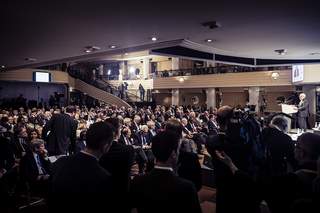
© Stiftung Münchner Sicherheitskonferenz
Waiting is the biggest risk
"The Great Puzzle: Who wants to pick up the pieces", the title of the current Munich Security Report, describes the main task of the 55th Munich Security Conference (MSC). It states a new competition between the United States, Russia and China as well as the absence of a leader standing up to preserve the liberal world order. "Waiting is the biggest risk," warns BDI President Dieter Kempf. The liberal, rule-based world order is under fire, Kempf found last year. This has increased in the last twelve months. As an export nation and the largest economy in Europe, Germany can not afford to be on the sidelines. In view of the results of the recent Pew Research Center survey conducted in seven countries, German commitment is all the more important: the German Chancellor and French President Emmanuel Macron are most likely to be credited with shaping international politics.
In light of tremendous global challenges – from issues of international disarmament to trade or climate change policies – Europe has to agree on a common foreign and security policy more than ever. Waiting is not a solution. In order to promote the dialogue on crucial security issues at this year’s MSC in Munich, the BDI was involved in several discussion and dialogue formats.
Artificial intelligence: a security-relevant key technology
With its position paper “Artificial Intelligence (AI) in Security and Defense”, German industry has developed policy recommendations and addressed important ethical issues. The BDI is aiming at a ban on lethal autonomous weapons systems (LAWS) and advocates classifying Artificial Intelligence as key military technology. However, the final decision on life and death must always lie with humans. At the same time, Germany has to keep pace with innovations in the field of security-related AI.
More autonomy for more ability to act in Europe
The Pew Research Center's survey shows the fundamental change of conditions of international politics. According to the survey, the German population considers the US a greater threat (49 percent) than China (33 percent) or Russia (30 percent). "America first" in the West and the strengthening powers in the East make the question of European Strategic Autonomy, a stronger autonomy of the European Union in foreign and security policy, all the more important. Europe must finally come closer together to uphold its interests in the future – this has become more than clear at this year's MSC.
But what constitutes strategic autonomy, to what extent it is politically and industrially necessary, and what steps are needed to implement it, has not yet been sufficiently defined. A starting point for strengthening Europe's security policy is a closer cooperation in the development and procurement of weapon systems. There lies great potential for reducing costs and developing a common strategic understanding.
The European Union already promotes bi- and multinational armaments cooperations through various measures. This is particularly important since the promotion of joint projects offers great economic opportunities, in particular for the innovative German security and defense industry. Cooperation projects between Germany and France, such as the Future Combat Air System (FCAS) and the Main Ground Combat System (MGCS), can be something to build on. However, it still lacks a common understanding of key issues including export. An arrangement as to when a jointly developed and produced system may be sold abroad is a prerequisite for implementing the approved projects. Restrictive German export practice often clashes with French ideas. For more Europe, the federal government will have to move.
Space: Future market with huge potential
The security and economic importance of space is growing. This rapidly developing future market holds great potential for German industry.
Space applications are of key importance to the industrialized country of Germany. They are the key to and the prerequisite for future technologies such as autonomous driving, digitization and Industry 4.0.
In light of the requirements of a modern industrial and information society, its importance will continue to increase worldwide. Business consultancies expect the global space market to increase by more than tenfold to 2,700 billion Dollars by 2040. At the same time, space could become the battlefield of the future. Space Force as well as an airborne missile defence are not science fiction but party of American government policy. The BDI takes up this topic at an early stage and is actively involved in the development of the German Space Act in the coming months.



